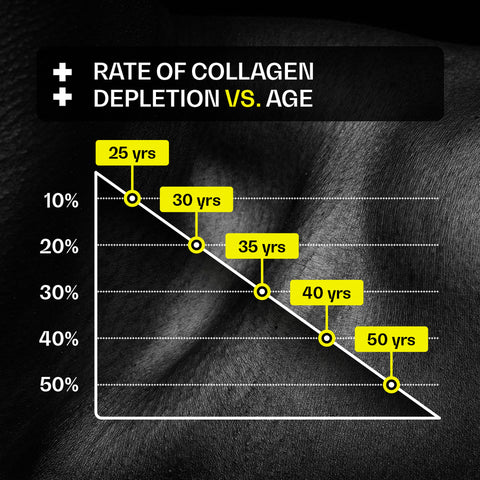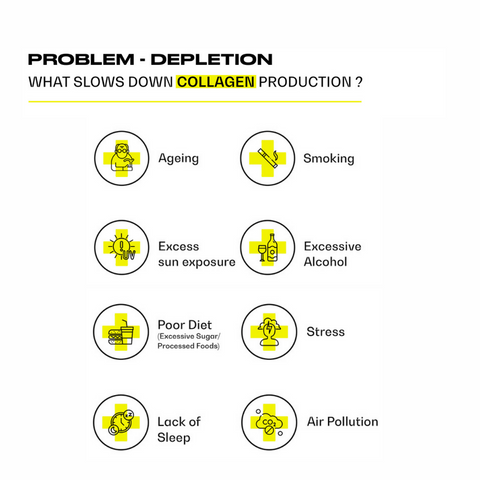IS COLLAGEN FOR MEN TOO?
Whether you want to recover faster from workouts, an increase in lean muscle mass, thicker hair or healthier, younger looking skin, collagen protein is a great supplement for every body – regardless of gender.
Collagen is the most abundant structural protein in the human body. Collagen is often called the body’s scaffolding. It’s the glue that holds the body together and is found in skin, muscles, tendons, ligaments, bones and all our connective tissues, with its purpose being to provide these body parts with their strength, structure, and elasticity.
As we get older, our bodies become less efficient at naturally producing collagen which is why so many people supplement their diet with collagen to keep their bodies in optimal working condition.
We begin to lose about 1% of our collagen per year in our mid-20s. By the time we get to 40, we will have lost around a third of our natural collagen, and the visible signs of ageing become more prominent.

Excess sun UV exposure, smoking and poor diet can also inhibit our natural collagen production and speed up the rate at which our collagen levels deplete.

There have been some impressive clinical studies (which we highlight below) that show that supplementing our diet with ingestible collagen may stimulate the body into producing collagen on its own and can help:
+ improve skin elasticity & hydration
+ boost muscle mass & strength
+ provide relief from joint pain
+ prevent bone loss
+ promote heart health
+ increase hair and nail strength
+ support gut health
Collagen is also an excellent protein source, packing in more protein per calorie than other sources while containing less sodium and sugar.
So, it comes as no surprise men’s health magazines, Dr’s and nutritionists say Collagen is the protein supplement men (and women) should be taking.
SO, WHAT IS COLLAGEN?
Collagen is the second most abundant substance in our body, after water. It’s the most abundant structural protein in the human body. Collagen is often called the body’s scaffolding. It’s the glue that holds the body together and is found in skin, muscles, tendons, ligaments, bones and all our connective tissues, with its purpose being to provide these body parts with their strength, structure, and elasticity.

As we get older, our bodies become less efficient at naturally producing collagen, which is why so many men supplement their diet with collagen protein to keep their bodies in optimal working condition.
WHAT IS A COLLAGEN SUPPLEMENT?
Although there are also several protein-rich foods we can eat to increase our collagen intake, including beef, pork skin and bone broth, we’d need to consume an enormous amount of bone broth to have any impact on our collagen levels.
High-quality collagen supplements contain animal collagen. Using a process called hydrolysation, the collagen fibres are broken down into smaller chains known as “collagen peptides” which makes it more bioavailable – i.e. easier to absorb. This is why collagen peptides are also known as hydrolysed collagen.
"Hydrolysed Collagen" is more effective because it contains a complete amino acid sequence as a collagen peptide and research shows that due to its very low molecular weight, hydrolysed collagen is absorbed at a higher level into the bloodstream and circulated throughout the body more easily than other forms of collagen.
Unsurprisingly, Marine collagen is extracted from the bones, skin, and scales of fish. When the flesh of a fish is removed to be used as food, everything that is left, and would otherwise be discarded, is cleaned, and collagen is extracted via the process hydrolysation.
Marine collagen is more sustainably produced and has less impact on the environment than for example bovine collagen which is sourced from animals (cows & pigs).
Studies that have looked at the absorption of collagen peptides found marine collagen tends to be absorbed 1.5 times better than bovine collagen due to its low molecular weight.
Furthermore, because Marine Collagen is sourced from fish, there is a lower risk of transmissible diseases and viruses that can affect animal products such as BSE (commonly known as Mad Cow Disease) and Foot-and-Mouth Disease.
Moreover, the structure and bioavailability of collagen peptides from marine fish are quite similar to those of humans across the gastrointestinal barrier.
Marine collagen is predominantly type I, which is used in our skin, hair, nails, bones, teeth, tendons, ligaments, vascular ligature, and organs. Type I collagen accounts for 90% of the total collagen in the human body.
WHY COLLAGEN IS IMPORTANT FOR MEN
Whilst collagen is usually associated with glowing skin or getting a youthful complexion, it also has numerous health benefits throughout your body particularly in places like your muscles, joints, hair and even digestion.
There have been some impressive clinical studies showing that supplementing your diet with marine collagen can increase your collagen intake and has multiple benefits such as:
+ improving skin elasticity & hydration
+ providing relief from joint
+ boosting muscle mass & strength
+ preventing bone loss
+ promoting heart health
+ increasing hair and nail strength
+ improving gut health
As we age, collagen levels decrease, by adding collagen into your diet, it’s super easy to boost your levels and reap the benefits. Let’s delve into some of these benefits below and answer your most frequently asked questions…
WILL COLLAGEN INCREASE MUSCLE MASS & STRENGTH?
Marine collagen is a protein that contains 19 different amino acids (including 8 of the 9 essential amino acids). Therefore, taking a daily marine collagen protein supplement can help to prevent injury, by building and repairing muscles, tendons, ligaments, and cartilage that are stressed during exercise by:
Replenishing Protein: Protein loss occurs in muscles during and after long periods of exercise due to oxidation, inflammatory reactions, and muscle microlesions. Collagen is an excellent protein source, packing in more protein per calorie than other sources while containing less sodium and sugar, and the combination of marine collagen’s high bioavailability with its high amino acid content makes it an optimal pre and post-workout supplement that rapidly absorbs and can quickly work to help repair and replenish proteins broken down during exercise.
Building & Repairing Muscles: During workouts, muscles absorb amino acids at a faster rate and don’t leave enough for other parts of your body. Collagen contains 19 different amino acids including glycine and proline which we need to maintain and repair our tendons, bones, and joints. When you work out, your muscles can be broken down and damaged. However, collagen supplements can help increase the levels of these amino acids, that are part of normal muscle structure, and help to build and repair the muscles, tendons, ligaments, and cartilage that are stressed during exercise. For example, in a controlled 12-week study, the men that took collagen supplements gained significantly more muscle mass and strength versus those that took a placebo. In fact, the amino acid Glycine is responsible for building muscle tissue and improving its mass, which then helps the body turn food into energy. It can prevent muscles from breaking down by boosting the level of creatine in the body. Boosting creatine in the muscles can help them to perform better in short, intense bursts of activity such as weightlifting or sprinting. Several studies have shown that boosting creatine in the body can lead to increased muscle strength, mass, and power, and it can help with recovery after exercise and rehabilitation after injury.
Side note: Challenging workouts can often lead to torn muscles, sprained ligaments & inflammation. Read here for tips you can incorporate to help your muscles heal faster.
WILL COLLAGEN BOOST METABOLISM & ENERGY?
Collagen is a protein that contains a whopping 19 different amino acids including glycine, glutamine and arginine which are all important for building and maintaining lean muscle mass. Muscles draw energy and nutrients from food, so generally speaking, the more muscle you have, the higher your metabolism.
Side note: One kilo of muscle mass increases your basal metabolic rate by up to 100 calories per day. On average, men between the ages of 25 and 35 lose about 3 kg of muscle mass despite maintaining the same eating habits. Ageing sucks! That loss of muscle mass means that we require about 2,100 calories per week less than before. If those excess calories aren’t cancelled out through diet or physical exercise, they’ll continue to be packed on in the form of fat week after week. If you want to lose fat, but not muscle, follow the science-backed steps here.
CAN COLLAGEN SUPPORT JOINT HEALTH?

Collagen helps maintain healthy cartilage, which is the rubber-like tissue that covers the surface of our joints, protecting them from wear and tear. As we age, the amount of collagen in our body decreases so we are at an increased risk of developing conditions such as osteoarthritis. The main symptoms of osteoarthritis are joint pain and stiffness. Furthermore, high impact activities and high-intensity sports can exert stress on joints that can lead to pain and injury.
Taking collagen regularly aids in the repair of cartilage tissue, as well as alleviating joint inflammation and pain, thereby easing daily tasks like walking, and climbing stairs, as well as exercising.
Clinical trials have shown supplementation with collagen may reduce activity and exercise-related joint pain. For example: A review of five studies in more than 500 people with osteoarthritis found that taking collagen daily for an average of 24 weeks led to significant improvements in joint stiffness and joint pain. A joint study by Harvard Medical School and Tufts Medical Centre showed that the patients taking Collagen had “significant re-growth of damaged cartilage” after a year. A study conducted by Penn State University showed that 73 athletes who consumed collagen daily for 24 weeks experienced a significant decrease in joint pain while walking and at rest, compared with the group that did not take it. In another study, adults that took collagen daily for 70 days had a significant reduction in joint pain and were better able to engage in physical activity than those who did not take it.
WILL COLLAGEN HELP HAIR LOSS?

No man, of any age, wants to lose their hair. Although it`s largely hereditary and due to genetics, hair loss can also be caused by medical conditions, hormonal changes, medications, radiation treatment and stress. But it can also occur as a result of a bad diet and a vitamin deficiency.
When it comes to our hair, the specific protein responsible for maintaining its structure and quality is keratin. As we age and keratin reduces, hair often becomes thinner, weaker and sometimes more coarse. Collagen contains amino acids in a very easy to absorb form and some of these amino acids are vital for the production of keratin, so a collagen supplement may be key to helping keep a healthy head of hair and preventing hair loss.
Furthermore, collagen is the primary component of the dermis, which is the connective tissue layer in our bodies that contains hair follicles. Collagen contributes to the elasticity and strength of our dermis. With age, our body becomes less efficient at naturally producing collagen and replenishing cells in the dermis, and this can be one of the reasons why our hair gets thinner over time.
Side note: Unexplained hair thinning and hair loss can give you sleepless nights. Read our tips here to help you maintain a healthy head of hair.
CAN COLLAGEN HELP REDUCE THE VISIBLE SIGNS OF AGEING?

Being in constant contact with the external environment, the skin is subject to more insults than most of our other organs and is where the first visible signs of aging occur. As we age, our natural collagen production begins to slow down which can result in sagging skin and the appearance of fine lines. Studies show that collagen supplements can have a beneficial effect on the appearance of skin. For example:
+ A meta-analysis published in 2023, comprising 14 randomized controlled trials involving 967 participants, found compelling results in the effectiveness of a 12-week regimen of hydrolysed collagen supplementation in improving skin hydration, elasticity, wrinkles, firmness and radiance.
+ A comprehensive meta-analysis published in 2021 in the International Journal of Dermatology, that had a total of 1,125 participants, found hydrolysed collagen supplementation showed favourable results in terms of skin hydration, elasticity and wrinkles. These findings were consistent across all 19 studies included. Based on the results, the research concluded that ingestion of hydrolysed collagen for 90 days is effective in reducing skin aging, as it reduces wrinkles and improves skin elasticity and hydration.
Side note: Follow our men’s skin care tips here to fight wrinkles, tired looks, dark circles, dull skin, acne, scars, and more.
CAN COLLAGEN PROMOTE HEART HEALTH?
Collagen provides our organs and blood vessels with structural support and strength. It provides structure to our arteries, the vessels that keep blood flowing to and from our heart. Arteries play a crucial role in distributing oxygen, nutrients, and hormones throughout our body. Weak, stiff, narrow, and inflexible arteries are linked with a higher risk of cardiovascular disease, blood clots, heart attacks, and stroke. Studies have shown collagen supplements may help reduce the risk of heart-related conditions. For example: A meta-analysis published in 2022 in the British Journal of Nutrition determined that collagen supplements positively affected biomarkers related to cardiovascular disease, with randomised placebo controlled trials showing that collagen supplementation can reduce artery stiffness, decrease levels of “bad” LDL cholesterol in the body, decrease blood pressure and decrease fat mass.
If our levels of LDL “bad” cholesterol are too high, it can build up on the walls of our arteries. This build-up is also known as cholesterol plaque. This plaque can narrow our arteries and limit blood flow.
DOES COLLAGEN HELP MAINTAIN STRONG BONES?
Bones are mostly made of collagen, a protein that provides flexibility (toughness) to the bone structure, and calcium, a mineral that helps build and maintain healthy bones.
Collagen contributes to the formation of strong bones that are less prone to breakage, plays a role in bone tissue regeneration, and prevents bone loss. As we age, the structure of our bones changes and this results in loss of bone mass or density. Low bone mass means bones are weaker and may break or fracture more easily. Studies have shown that collagen supplementation may help improve bone mass density and slow osteoporosis. For example, a randomized year-long controlled study of 131 participants (with a mean age of 63 years), found that 5 grams of collagen peptides a day significantly improved bone mineral density. In addition, collagen supplementation was associated with a favourable shift in bone markers, indicating increased bone formation and reduced bone degradation.
DOES COLLAGEN HELP GUT HEALTH?
A key feature of a healthy gut is a happy and healthy gut lining. Collagen plays a crucial role in maintaining the health of our connective tissues, including the gut lining.
The gut lining acts as a barrier, preventing harmful substances from entering the bloodstream. However, stress, poor diet, and ageing can compromise the integrity of the gut lining, leading to a condition called "leaky gut." When the gut is “leaky”, bacteria and toxins enter the bloodstream, and can cause widespread inflammation and possibly trigger a reaction from the immune system and make us sick.
Scientific studies have shown that collagen supplements can help repair the gut lining, reduce inflammation, and promote the growth of beneficial gut bacteria. For example, a study published in 2022, found that a daily collagen peptide supplement for 8 weeks led to an increase in bowel movements and participants saw less bloating and an improvement in mild digestive symptoms.
WHICH COLLAGEN IS BEST?
The benefits of collagen for men are there for the taking, but you need a supplement that contains high-quality collagen peptides that are easy your body to absorb. You also want that supplement to be easy to incorporate into your daily routine, and it might help if the product is not blatantly marketed at women, right?
HIMMENSE SHIFT is the collagen supplement that ticks all those boxes. Each 20ml ready to drink sachet contains 6000mg of hydrolyzed marine collagen protein plus vitamin C, for normal collagen formation, as well as vitamins A, B2, B3, B5, B6, B7, B12, D3, Selenium plus Ashwagandha for multiple health benefits.
So, if you’re looking for a way to get collagen protein into your body quicker with little to no prep time, we recommend taking HIMMENSE SHIFT daily. Like a shot of tequila. But good for you. Simply snap the pouch in half using one hand and squeeze the contents in to your mouth.

Advice is for information only and should not replace medical care. Consult a doctor or healthcare professional if you have any questions or are taking any other medications before you try any remedies.
Read more Men's Health & Lifestyle blogs from HIMMENSE here.




